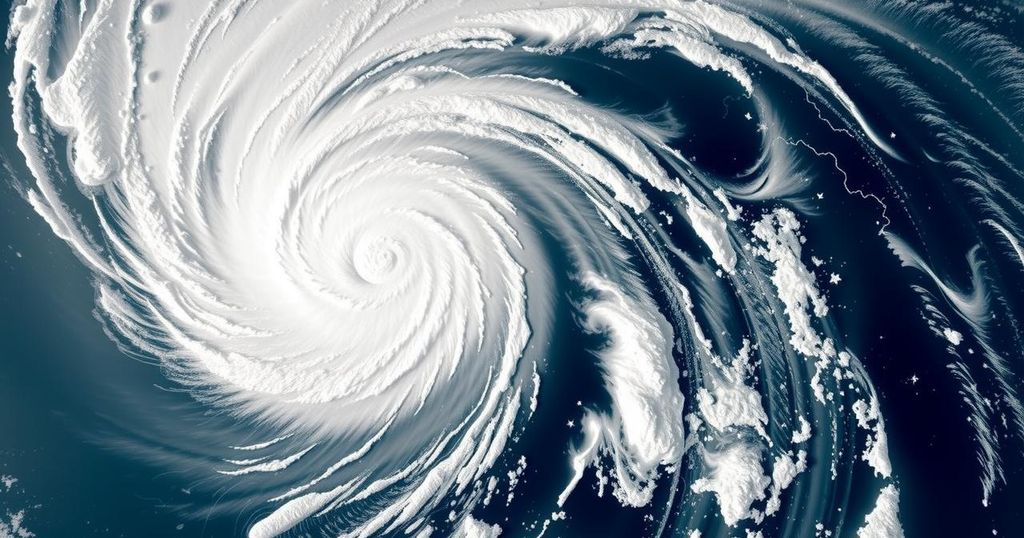Tropical Cyclone Chido Devastates Mayotte, Approaches Eastern Africa

Cyclone Chido has caused widespread damage in Mayotte with winds exceeding 220 kilometers per hour as it heads toward the east coast of Africa. Significant infrastructure destruction has occurred, although there are currently no reported fatalities. French authorities are mobilizing rescue teams, while preparations are being made in Mozambique, Malawi, and Zimbabwe for the cyclone’s anticipated impact. This season has seen heightened concerns due to increasing cyclone severity attributed to climate change.
Tropical Cyclone Chido has inflicted significant devastation on the French territory of Mayotte, located in the Indian Ocean, as it progresses towards the eastern coast of Africa. The storm, exhibiting wind speeds exceeding 220 kilometers per hour, caused severe damage, including the destruction of metal roofs across the islands home to over 300,000 residents. Fortunately, there have been no immediate reports of fatalities. Mayotte Prefect, Francois-Xavier Bieuville, stated that this cyclone is the most violent experienced since 1934, with many residents suffering immense losses. Although the highest alert level was subsequently lifted to facilitate rescue efforts after the storm’s peak, the general public remains under red alert, advised to stay in secure shelters.
French Interior Minister, Bruno Retailleau, confirmed that Mayotte has been profoundly affected, with extensive damages reported. Thousands of homes have lost power, and numerous small structures, such as tin huts, have been completely destroyed. In response to the calamity, a contingent of 110 rescuers and firefighters has been dispatched from France and nearby Reunion, with additional support scheduled for the following day. The nearby nation of Comoros is also bearing the brunt of Cyclone Chido, prompting authorities there to implement a red alert and express concern about a missing group of fishermen.
As Cyclone Chido continues its progression, forecasts indicate it may make contact with the Mozambique coastline by late Saturday or early Sunday, potentially affecting millions in the northern region, particularly in Cabo Delgado and Nampula provinces. Preparations are also underway in Malawi and Zimbabwe, with authorities issuing warnings for possible evacuations and advising citizens to relocate to higher ground. The cyclone season typically spans from December to March in the southeastern Indian Ocean, a period characterized by increasingly severe storms exacerbated by climate change, and has historically resulted in devastating humanitarian crises across southern Africa.
In past instances, such as Cyclone Idai in 2019 and Cyclone Freddy in the previous year, significant loss of life occurred, highlighting the cycle of destruction. The aftermath of cyclones often includes risks such as flooding, landslides, and outbreaks of waterborne diseases, emphasizing the urgent need for humanitarian assistance in affected regions, which contribute minimally to global climate change yet face its dire consequences.
Tropical cyclones are a recurring phenomenon in the Indian Ocean, particularly during the cyclone season from December to March. These storms have a history of inflicting considerable havoc on countries in southeastern Africa, particularly nations such as Mozambique, Malawi, and Zimbabwe. Climate change is identified as a contributing factor to the increasing severity of these cyclones, creating significant humanitarian challenges for affected nations. The region has previously experienced catastrophic cyclones, prompting the need for robust disaster management strategies and international support following events of devastation. The impact of cyclones extends beyond immediate destruction, often leading to long-term public health crises and socioeconomic struggles for communities already facing vulnerabilities due to their limited resources and contributions to climate change.
In conclusion, Cyclone Chido has ushered in a period of devastation for Mayotte, with extensive damage and a high alert for future risks. The impact on surrounding regions, particularly Mozambique and Comoros, necessitates immediate action to safeguard lives and property. As the frequency of severe cyclones correlates with climate change, the challenges faced by these nations underlines the need for international cooperation and sustainable support mechanisms. The aftermath of such storms not only threatens infrastructure but also elevates risks of disease outbreaks and social unrest, emphasizing the need for ongoing humanitarian efforts.
Original Source: www.voanews.com








